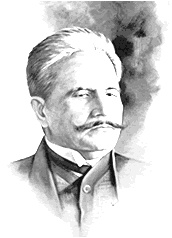Life Is Action, Not Templation
The greatest religious teacher and philosophers of the world have enjoined a life of action service, condemning flight from the world or retirement in seclusion and self-isolation. The Quran the Bible have the same massage to offer. Those who believe and do good have a reward never to be cut off, thus reads verse in the Quran. Another highly significant verse of the Quran says; the believers are those who believe an Allah and his messenger and afterwards doubt not, but strive with their wealth and there lives for the cause of Allah. Such are the sincere.’’ If we reflect on the import of these Quranic verses, we realize that repudiates that type of negative contemplation which preaches pessimism and leads us to turn our back upon the world and active life. But the Quran is not opposed to a progressive and constrictive type of contemplation which is the cornerstone of faith in Allah and His Messenger. Thus Islam condemns asceticism but upholds the dynamic type of reflection and prayer fullness which pave the way to a life of fruitful action, for no action of the right type can be performed without an unshakable faith in God and His Holy Prophet (SAW). This is the lesson which is really worthwhile Muslims philosophers and poets teach in accents. “Thou shalt work always, careless of the fruit of thy labour” is the teaching of the Gita, the Bible of the Indus. It differs from the Islamic teaching because the Quran promises a rich reward to those who live and die for Islam and truth.

Iqbal is the greatest exponent of Islamic ideals in recent time. He upholds the harmonious blend of progressive contemplation in action leading to the perfection of human personality. The whole of his poetic message is directed to the attainment of this great and the sublimation of human character through self-realization and purposeful action. Although he was a great artist in the domain of poetry, yet all his musical appeal and richness of expression is subordinated to the higher purpose of living for great causes and sublime ends.

After my exit from this world, the people will read my poetry, fathom in to its meaning and declare; “a whole world was revolutionized considered art for art’s sake to be sheer dilettantism and petty aesthetic gratification. His is not tinsel glory and cheap glamour of mere rhythm and flow of words, but his poetic message is primarily meant to uplift and galvanize the Muslim nation, crushed by an utter lack of confidence and complete forgetfulness of its great heritage. This harmonious blending of high content value with perfection of from in Iqbal is a rare achievement in the field of poetry. His poetry is not th song lotus-eaters tending to sleep and indolence. His is the message of ever advancing action and never ending progress in the attainment of great goals and purposes. Islam calls for brave and sturdy men who can unsheathe their swords in the cause of truth and national honor. To turn ones back upon the enemy and run away from the battlefield in panic is an unpardonable sin in Islam.

And yet in spite of persistent emphasis on a life of action by great men, both individual and nation some forget this ideal of constant isolation from society. In the middle ages there arose many monasteries in the west as well as in the east; where friars and nuns practiced piety in seclusion. Monasticism is the general name given to an organized life of asceticism. It includes the idea of a withdrawal from the world and dwelling apart . As hayrack points out, Christianity, rightly understood inculcates the spirit of social service and a life of useful and beneficent action, but in the Middle Ages Christianity was deeply influenced by eastern religious ideas emanating from Hinduism, Buddhism and other creeds of that nature which preached asccticism of the most rigorous type. If we read the story of the good Samaritan in the new testament carefully, we realize that Christ “s mission had social service as its cardinal principle. But as a result of other extraneous influences set.

Benedict of Nursia, off during the later middle ages into abbeys, priories, nunneries and convents. A large number of them exist even today in England as elsewhere in Europe these members of these religious bodies live in cloisters and practice all sorts of unreasonable austerities. This sort of monasticism is utterly alien to the genius of Islam. Some misdirected Muslim mystics who have not entered into the spirit of the Quran and Islam have been taking recourse to it in direct defiance of the principles of life laid down by the Holy prophet [ SAW ]. Iqbal has condemned this soul-crushing tendency in the following forceful lines.

Allama Iqbal said in his Urdu poetry that “Come out of the monasteries and revive the tradition of Husain by sacrificing your life in the cause of truth. The spiritless asceticism practiced in these hermitages brings nothing but sorrow and grief. Your religion and literature smell of asceticism which is a marked characteristic of decadent and perishing nations”.
In Europe the reaction against a life of static contemplation divorced from action began in the eighteenth century. In this century Voltaire vehemently condemned superstition and unreason. he was the negative genius of the age. Goethe was the positive genius of the nineteenth century and the age that followed. When he sad “life is action, not contemplation,” by contemplation ‘ he meant sterile brooding and not that forward-looking and fruitful contemplation which was the motive-force behind all his own great achievements. A distinguished philosopher has truly observed that goethe’ s poetry and philosophy as revealed in Faust contain the seed of all that we boast of as modern civilization and culture. Iqbal’s Piyam-e-Mashriq, is in response to yhe message of Goethe in his poetry. When, therefore, Goethe, prefers a life of action to a life of contemplation, he merely puts on record the inward bent and temper of the modern mind.




